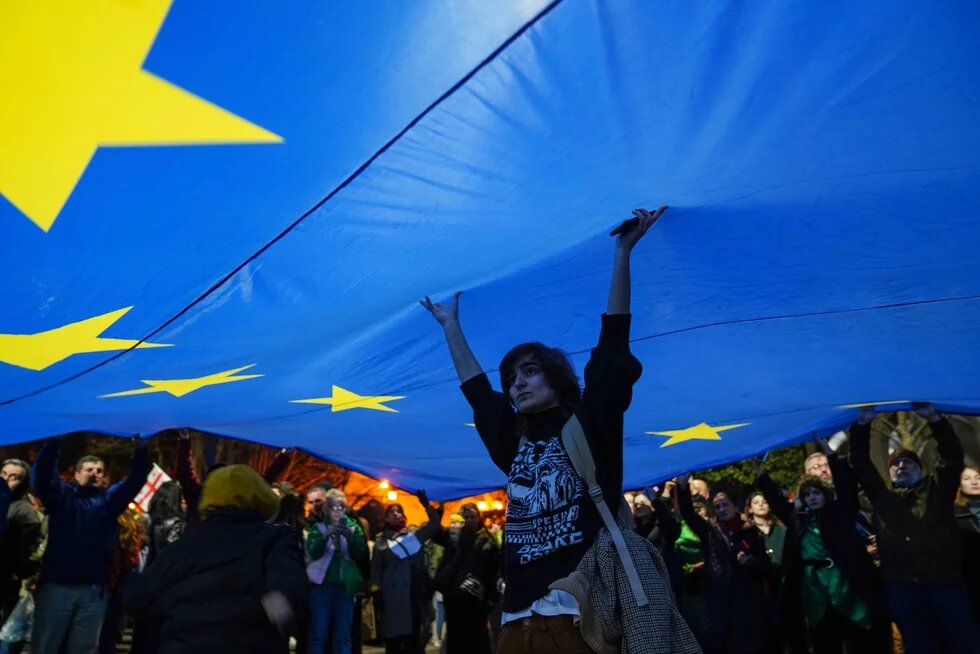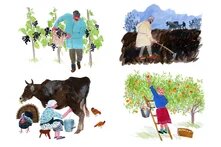On June 3, the law "On Transparency of Foreign Influence", often referred to as the "foreign agents law", was signed into force in Georgia. Numerous critics both inside the country and in the West hold that the law will decimate civil society and bring about the beginning of the end of Georgian democracy. Their neighbors in the region are no less concerned about the situation than the Georgians themselves. We asked why Azerbaijani civil society takes the political crisis in Georgia so close to heart and what threats it sees in it for itself.

To begin, some purely psychological and emotional factors.
Over the past 20 years that followed its 2003 Rose Revolution, Georgia has been seen as a role model by the Azerbaijani civil society, as well as a significant part of society at large (even if no one has tried to imitate it). The only bright spot on the map of the region, the "Island of Democracy", the local "branch of Europe" was Georgia’s reputation until now, a country where freedom reigns, prices are kept low, the authorities are egalitarian, the police are kind and the sun shines brighter.
A fair amount of romanticizing and idealizing Georgia’s experience had taken place in Azerbaijan, yet as we know, everything is learned through comparison... Plus, parting with romantic illusions is always painful.
But there are, of course, factors of a much more pragmatic nature.
"Battle for the Caucasus"
Sharing and commenting on photos and videos from the 2024 spring protests against the law "On the transparency of foreign influence", Azerbaijani activists expressed the usual green envy ("some people know how to defend their rights!"), but also the belief that right at that moment "battle for the Caucasus" was waged on Rustaveli Avenue in Tbilisi.
"The people of Georgia are now deciding the fate of the entire South Caucasus!" - many repeated. To them, if the protesters win, it will mean hope for democratization of the entire region, a weakening of Russia's position and a strengthening of the beneficial influence of the West.
This thesis was voiced even by some members of the nationalist and pan-Turkic opposition, which normally does not have much sympathy for the West.
Though these reactions may be interpreted as infantile shifting of responsibility, a desire for someone else to absolve you of your own problems, Azerbaijani political activist and former political prisoner Giyas Ibrahim considers this hope, though still unfulfilled, to be quite valid.
In May, Giyas traveled from Baku to Tbilisi especially to observe the protests against the "foreign agent law". Like many of his compatriots, Giyas is convinced that strengthening democracy in Georgia can have a positive effect on the human rights situation in Azerbaijan. Or, at least, prevent them from deterioration. Since, in his opinion, the Azerbaijani government depends on the situation in the region more than it may seem:
"Any way you look at it, the situation in neighboring countries affects Azerbaijan. Strengthening civil society in Georgia, including international organizations based there, played a significant role in enabling Azerbaijani civil society to partially recover from the 2013-2014 crisis and continue to exist in at least some form. The Azerbaijani authorities will not be able to truly tighten the screws as long as there is at least one democratic country in the region.
Moreover, this affects all three countries in the region. If at least one democratic country remains in the South Caucasus, it will keep the other two countries from becoming completely authoritarian, and authoritarianism will regress. Until now, Georgia has been that country. And I hope it will become one again."
Regional Hub
By the "crisis of 2013-2014," Giyas Ibrahim means the amendments to the laws "On Non-Governmental Organizations" and "On Grants" adopted in Azerbaijan at that time. These amendments obliged foreign donors to register every grant they issue to local NGOs or media with the Ministry of Justice, and to obtain a conclusion from the relevant executive authority on the financial and economic feasibility of each grant. In essence, they required acquiring direct permissions from the authorities. As a result, many donors simply left the country, and their recipient organizations closed down, exactly what Georgia's civil society is now afraid of happening.
In connection to the Armenian-Azerbaijani conflict, Georgia is the closest neutral territory for the implementation of regional projects, including peacebuilding, where specialists from different fields and, most importantly, young people from Armenia and Azerbaijan can communicate. Headquarters of all regional representative offices of foreign funds, international organizations, and editorial offices of regional media are based in Georgia and this is where most regional trainings, seminars, conferences, festivals and other events organized by NGOs and civil society institutions with the support of foreign donors are held.
Over the past 10 years, Georgia has been the most accessible platform for both regional cooperation and cooperation with international organizations for Azerbaijani activists, independent journalists, filmmakers, researchers, artists, and others. Therefore, if the darkest forecasts realize and the Georgian authorities impede the work of these funds and organizations, the activist activity of the entire region will automatically choke.
However, Sevil Huseynova, project manager at the CISR Berlin research center, suggests considering another perspective along with the negative consequences of the adoption of this law for the work of regional and international NGOs:
“If you do not apply the Russian scenario to Georgia - and this is exactly what everyone is doing now - then you understand that, in fact, it is still completely unknown how events will develop. How the law will be implemented, what the results of the parliamentary elections will be, etc. In general, nothing is known yet, except for the fact that this law has passed. Moreover, few people outside of Georgia have read it and know what exactly is written in it.”
The activities of the CISR Berlin registered in Germany are also closely connected with Georgia:
"After 2022, Georgia became the most important platform for projects related not only to the South Caucasus, but also to the post-Soviet space in general. Over these two years, we have held various meetings, workshops and other events in Tbilisi and other cities for representatives of civil society not only from the South Caucasus, but also from European countries, Russia, Ukraine and Belarus.
Of course, if the new law makes such activities impossible, it will be a significant blow to us. But another scenario is also possible: even if the Georgian authorities do take control of local NGOs, they may “turn a blind eye” to events and projects that are not directly related to Georgia and that take place without the participation of Georgian organizations. In this way, Georgia will continue to receive income from “tourism” related to the work of regional NGOs or international organizations, while partially preserving the status of a hub for the post-Soviet space, which it still is.” At the same time, Sevil Huseynova wonders whether they are ready to continue working in a country where such a repressive law will be applied to local activists and organizations? “I believe that we must be ready to express our solidarity with civil organizations and activists in Georgia in any development of events,” she concludes.
Unreliable refuge
Remarkably, Georgia has served as the easiest and most popular route for ideological migration. Yes, the Azerbaijanis had blazed this trail long before its discovery by the Russian “relocants”.
Sevda Samedova is the editor of the Russian-language version of the independent Azerbaijani online publication Meydan TV. Living in Georgia and having Georgian citizenship, Sevda almost never missed a single protest against the foreign agent law and often met activists and journalists from Azerbaijan there.
“They came to these protests not just to stare, and not even to express their solidarity with Georgian civil society. These people, who moved to Georgia for political reasons, actively participated in the protests because it also concerned them. They understood that the adoption of this law would hit them too. And to some extent even more than the Georgians, since they are in a more vulnerable position,” she explains.
According to Sevda, the Georgian offices of international organizations such as Human Rights House or Amnesty International have provided significant support to political migrants from Azerbaijan for many years, in particular to former political prisoners: “They initially provided them with housing, helped them with money, gave them legal advice, provided psychological rehabilitation… If these organizations leave Georgia, then the Azerbaijani political migrants will be left to the whims of fate.”
Sevda adds that in recent years, Azerbaijani political emigrants in Georgia have not felt completely safe anyway.
According to Natia Tavberidze, coordinator of Human Rights House Tbilisi, these people’s fears are not unfounded. She recalls the case of Azerbaijani journalist Afgan Mukhtarli, whose abduction from Tbilisi and subsequent arrest in Azerbaijan in 2017 have still not been properly investigated.
“In addition, there has recently been a tendency to persecute the local civil society sector in Georgia. And finally, there is close cooperation between the two countries,” says Tavberidze.
Journalist Aytan Farkhadova moved to Georgia from Azerbaijan in 2019, soon after the lifting of the ban from leaving the country imposed on her as part of a criminal case against the media outlet she worked with.
Aytan now lives in Tbilisi and works for the regional online publication OC Media, which operates on foreign grants, and therefore falls under the foreign agents law.
"This is some kind of frightening déjà vu. It's as if I found myself in 2013 again, when a similar law was adopted in Azerbaijan. That is, in 10 years I find myself in such a situation for the second time, only this time in Georgia," says Aytan.
According to her, like many other Azerbaijanis, Georgia has become a second home:
"Not just a visa-free country to which one can go, but a country with the closest possible culture and mentality, and at the same time more democratic, freer and more comfortable. And now we are losing this homeland."
But, no matter how the situation unfolds, Aytan does not want to leave and look for a new, more reliable haven:
"I will stay in Georgia and share its fate, whatever it may be."
Unlike her, many other Azerbaijanis living in Tbilisi are considering potential escape routes.
Meet Georgia...
The decisive "battle for the Caucasus" is still ahead. It is likely that closer to Georgia’s October elections, Azerbaijani civil society and immigrant communities in Georgia, currently in the state of frustration and confusion, will spring back to once again show their support for the opposition.
There is also a very unexpected positive aspect to all this: Azerbaijanis have become seriously interested in the domestic political situation in Georgia for the first time in decades.
Previously, even the most politicized part of Azerbaijani society had never really delved into what was happening in the neighboring country. Perhaps this lack of awareness was the basis for the idealization mentioned above. Or, on the contrary, idealization or romanticization, a subconscious unwillingness to take off the rose-colored glasses were the basis for the lack of awareness.
Now, for the first time, serious analyses and short pieces explaining the situation in Georgia (such as this one) have begun to appear in the Azerbaijani information field. It is likely the Azerbaijani civil society has finally found the opportunity to truly see their comrades on the other side of the border and consider their problems, rather than being under the delusion that they have no problems at all.
The Content of the article is the sole responsibility of the author and can in no way be taken to reflect the views of the Heinrich Boell Foundation Tbilisi Office - South Caucasus Region

